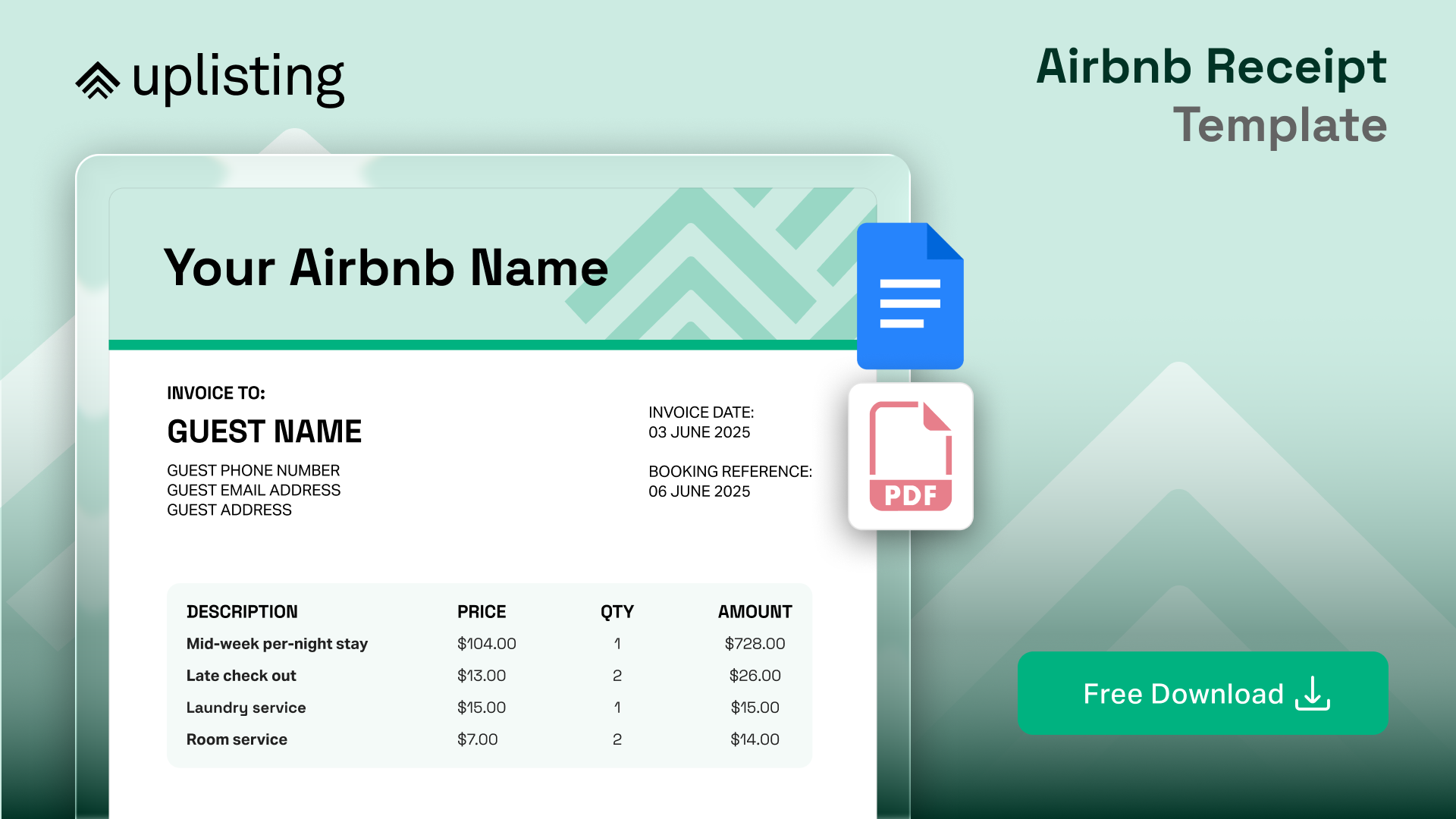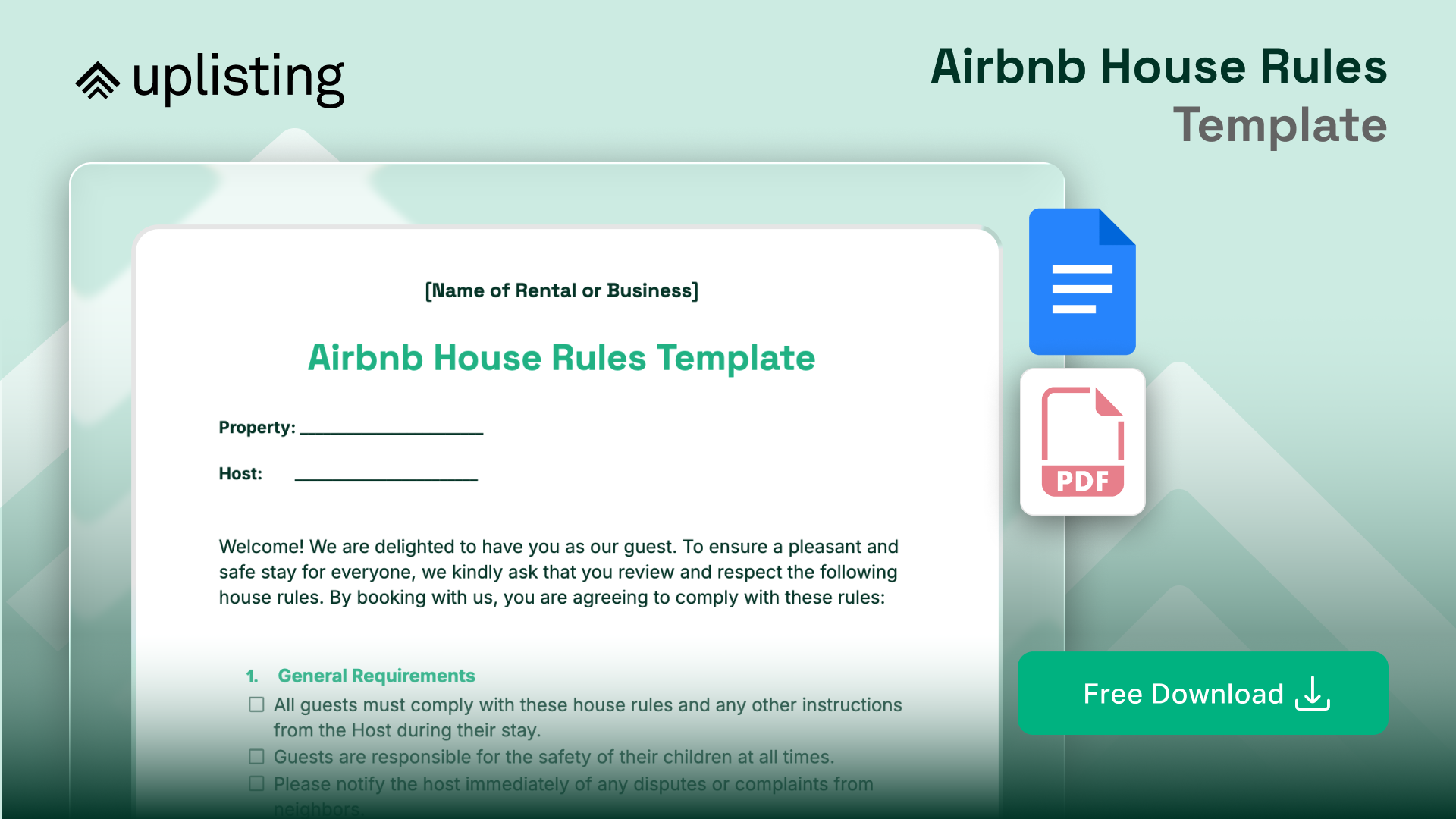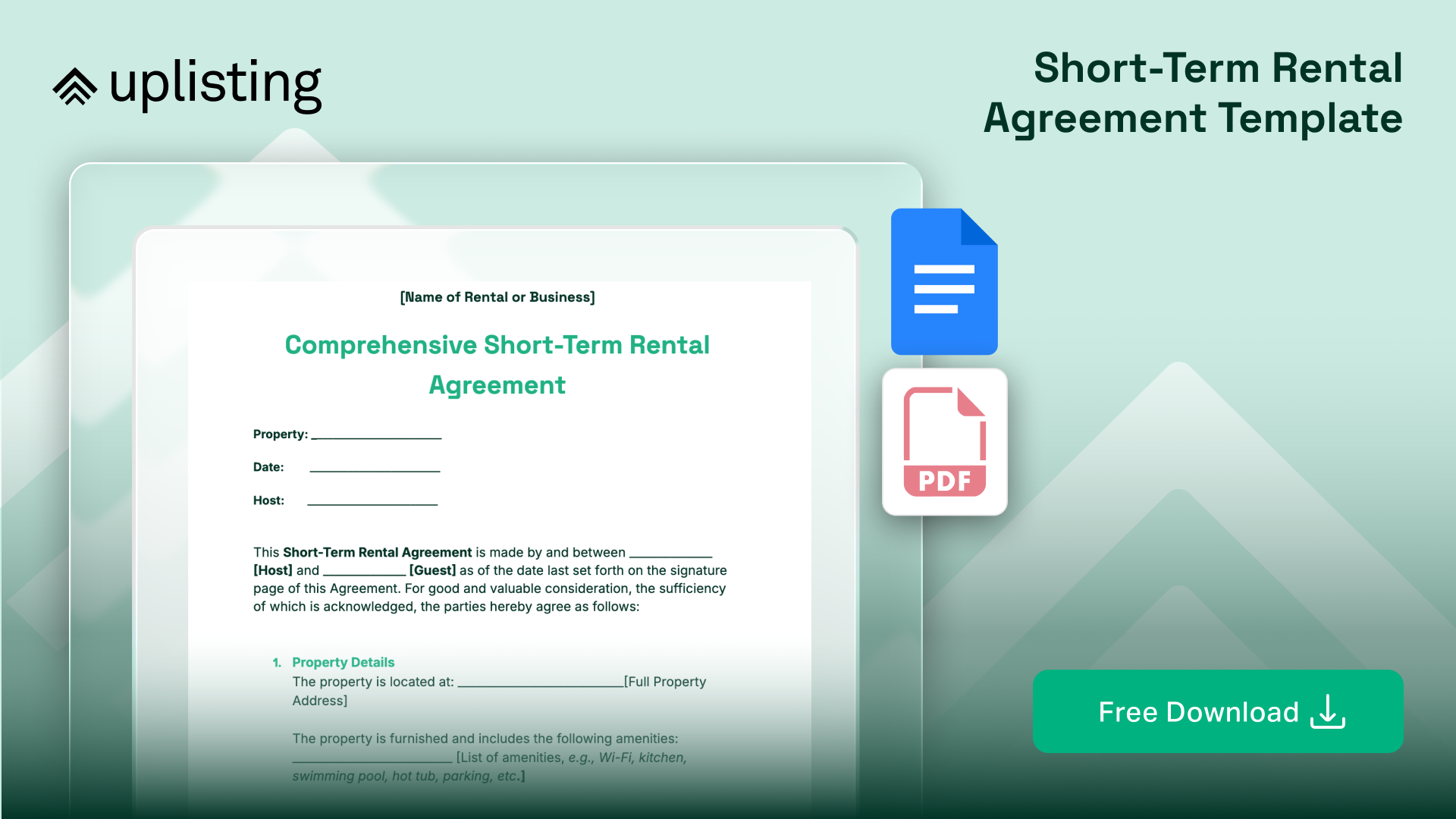Key Takeaways
Canceling an Airbnb booking as a host can lead to penalties, lower visibility and fewer bookings
Airbnb allows host cancellations in specific situations but most last-minute ones are penalized
The most successful hosts avoid cancellations altogether through smarter booking settings and guest screening
You've accidentally double booked your Airbnb and have two guests on their way to your property. Oops! Now what?
Unfortunately, last-minute cancellations as a host can wreck your visibility, derail your booking flow and damage your reputation. Understanding how the Airbnb host cancellation policy works, when you can cancel without penalty, and how to avoid cancellations altogether helps you stay in control and keep your listing penalty-free.
This article breaks down exactly what to expect when canceling a booking as a host, what Airbnb’s rules allow, and how to protect your listing from unnecessary penalties. Whether you’re dealing with a red-flag guest or trying to prevent double bookings, we’ll walk you through what matters most.
What Airbnb’s Host Cancellation Policy Says
The rules on Airbnb are pretty simple. Once you confirm a reservation, you're expected to follow through. Airbnb holds hosts accountable for every booking they accept because one canceled stay can damage guest trust—and that trust drives reviews, search rankings, and future bookings.
The penalties aren’t just financial. Canceling without a valid reason triggers a fee, usually starting at $50 and going up to 50% of the reservation value, depending on how close the cancellation is to check-in. Airbnb deducts the fee from your upcoming payouts. You’ll also lose the chance to rebook those nights since your calendar will be blocked for the canceled dates. Cancel more than once without a legitimate reason, and you could lose your highly-coveted Superhost status or face account suspension.
Airbnb does make room for emergencies through its extenuating circumstances policy. That includes serious illness, natural disasters, or legal travel restrictions. You’ll need to submit documentation, and even then, Airbnb often withholds payouts for the affected reservation. The bar is high and meant to prevent cancellations based on preference rather than necessity.
You can’t cancel because a guest seems “off,” you forgot to block a date, or someone offered to book for longer. Airbnb also warns against nudging guests to cancel on your behalf—it’s against policy and can trigger account reviews. If you plan to cancel a reservation, make sure the reason is clear, verifiable, and rare.
So automatic, you won’t know what to do with yourself
Put my rentals on autopilot
It’s simple to automate repetitive tasks with Uplisting's short-term rental software. You’ll save hours every week and eliminate human error. Go ahead — take some time off.
When Hosts Can Cancel Without Penalty
Sometimes hosting throws you a curveball—and canceling is the only smart move.
Airbnb gives a few clear outs where you won’t get dinged with penalties, calendar holds, or a bruised reputation. But you’ll need solid proof and a valid reason.
If the guest breaks house rules before arrival
You don’t have to go through with a reservation when a guest openly plans to ignore your rules. If someone messages about hosting a birthday bash, sneaking in ten friends, or bringing a dog to a pet-free listing, you can cancel without penalty. Airbnb just needs something to back you up—screenshots, message threads, or booking notes all count. A vague feeling won’t cut it. Send the proof, cancel cleanly, and move on.
If Airbnb approves an extenuating circumstance
Sometimes there’s no way to host safely—wildfires, medical emergencies, or government travel bans can shut everything down.
In cases like these, Airbnb steps in through its extenuating circumstances policy. You’ll need to upload documents that explain what’s going on, like a doctor’s note or evacuation notice. If Airbnb agrees, you won’t pay fees or lose status. You also won’t get paid for the reservation.
If you feel unsafe or there’s a booking mismatch
You’re not expected to host when something feels off and you can prove it. Maybe the guest booked under one name, but messages come from someone else. Or maybe their tone shifts and they start avoiding direct questions. Airbnb lets you cancel penalty-free when a reservation doesn’t line up with the details provided or safety becomes a concern. Just be ready to explain the situation and show any messages or inconsistencies. The more specific, the better.

What Happens When You Cancel Anyway
Canceling a reservation without meeting Airbnb’s approved exceptions hits fast and hard. Some penalties are obvious—others show up later and hurt more. For hosts managing just a few properties, even one cancellation can ripple through search rankings, payouts, and guest trust.
You’ll pay a fee, no matter when you cancel
Airbnb charges a cancellation fee that comes straight out of upcoming payouts. The closer the reservation is to check-in, the higher the cost—typically between $50 and $100. There’s no getting around it unless Airbnb grants an extenuating circumstance. And even then, the payout usually disappears.
You lose both the booking and the calendar dates
Once you cancel, Airbnb locks those dates on your calendar. No chance to rebook the nights or replace the stay with a last-minute guest. That’s money left on the table, especially frustrating when a simple mistake or miscommunication triggered the cancellation in the first place. Airbnb enforces this rule to prevent calendar manipulation—but it also blocks hosts from recovering lost income.
Superhost status becomes a lot harder to keep
Cancel three reservations in a year, and Airbnb takes away Superhost status. Doesn’t matter how many five-star reviews you’ve earned or how long you’ve hosted. Airbnb uses cancellation history as a signal of reliability, and too many cancellations push your listing out of the Superhost program. Once that badge disappears, expect fewer bookings and less visibility from repeat guests who filter by Superhost listings.
Fewer bookings follow you around
Airbnb’s search algorithm doesn’t forget. Canceling confirmed stays makes your listing look less reliable, and that affects where you show up in search results. A lower rank means fewer eyes on your listing. Less visibility leads to fewer bookings. For hosts managing one to five rentals, that drop can hit hard—especially when relying on short gaps or last-minute stays to fill the calendar.
Create 5-star guest experiences
Give your guests unforgettable experiences
With Uplisting, you can send the right messages at the right time on all booking sites. Read and respond to guest messages in a single, unified inbox — whether you’re at the office or on the go.
How to Reduce the Risk of Needing to Cancel
Cancellations aren't just frustrating—they often come with penalties, lost income, and fewer future bookings. A few small changes in how you manage bookings can prevent nearly every situation that leads to a cancellation.
Use strict booking settings
Each reservation request should feel like a good fit, not a risk you’re pressured to take. Turning off Instant Book gives you more control, especially if you're still getting the hang of hosting or operating in a market that draws unpredictable guests. If keeping Instant Book on feels necessary, make sure the requirements are set to filter for government ID, verified profiles, and past positive reviews.
Adding custom questions helps you learn what you need to know before confirming. Ask why the guest is visiting, who’s staying, or whether they’ve booked short-term rentals before. If someone avoids the questions or gets vague, that’s usually a sign to move on. Better to say no upfront than cancel later and pay for it.
Set clear house rules and listing details
Misunderstandings often start with unclear listings. Saying “no parties” means different things to different people. Mentioning Wi-Fi doesn’t mean it’s strong enough for video calls. When expectations don’t match reality, guests get frustrated—and you’re the one left cleaning up the fallout.
Be specific about what’s included and how the property works. List check-in times, quiet hours, parking info, and anything that could trip up a guest. If the home isn’t suitable for kids or pets, say so upfront. If you don’t host locals or allow late check-ins, make that obvious in the listing. Guests can’t follow rules they never saw.
Sync your calendar across platforms
Double bookings are one of the fastest ways to trigger the Airbnb host cancellation policy. Listing across Airbnb, Vrbo, and direct channels without a synced calendar creates a huge risk. One missed update and now two different guests think they’ve booked the same weekend.
Using a property management system to sync calendars in real time removes that problem. Real-time syncing keeps availability accurate, blocks booked dates instantly, and cuts out manual updates that almost always slip through. Automating confirmations and messages also reduces back-and-forth, which helps avoid timing errors or missed stays. Less juggling means fewer problems—and fewer reasons to cancel.
Reduce the Risk of Cancelling with Uplisting
Canceling a reservation might feel like the only way out when something doesn’t sit right—but the aftermath tends to stick. Calendar blocks, lost payouts, and lower search visibility drag down your momentum. Avoiding penalties under the Airbnb host cancellation policy starts with better tools and smarter filters that keep risky bookings out from the beginning.
Automate guest screening before confirmation
Manual screening eats up time and still lets problems slip through. Booking rules cut that risk by filtering guests automatically. Require verified profiles, government IDs, and positive reviews across Airbnb, Vrbo, and Booking.com. Add custom questions to learn who’s booking, why they’re visiting, and how many people are coming. When someone dodges the details or sends a vague message, you’ll catch it before clicking accept.
Keep your calendar synced and airtight
Double bookings create chaos fast. Calendar syncing across Airbnb and other platforms blocks booked dates instantly, so you won’t have to update anything by hand. One missed update can lead to two guests arriving at the same time—then comes the cancellation, the fee, and the calendar lock. Real-time syncing keeps your availability accurate without extra work.
Use smart booking rules to stay in control
No one wants to cancel because of an unexpected 1-night stay over a peak weekend or a midnight check-in that wasn’t supposed to happen. Set rules for minimum stays, lead time, and check-in windows based on how you actually run your short-term rental. When the setup matches your workflow, the right guests book—and the wrong ones never make it through.
Centralize guest messaging and response tracking
Miscommunication is a common cause of last-minute cancellations. A guest misses a check-in note, assumes no one’s responding, and cancels on the spot. Centralized messaging keeps everything in one place. Automated messages cover key info—like access codes, arrival times, and house rules—so nothing gets overlooked. You can track delivery, confirm reads, and follow up when needed.
When daily tasks run on autopilot, you avoid the scramble. Fewer surprises mean fewer cancellations—and a cleaner, more reliable listing.
You’re in great company
Sign up
Some of the largest short-term rental operators (with 250+ properties) rely on Uplisting's software to scale their businesses.
The Bottom Line
Understanding Airbnb’s host cancellation policy is essential for protecting your revenue, reputation, and long-term performance on the platform. While Airbnb offers exceptions for emergencies and rule violations, most cancellations trigger penalties that impact your payouts, calendar, and search visibility. Knowing when you can cancel without consequences—and when you can’t—keeps your business running smoothly.
The best way to avoid cancellations is by tightening your booking settings, communicating clear house rules, and relying on automation to reduce errors. With the right tools, you can prevent risky reservations before they’re confirmed and maintain guest satisfaction without sacrificing control. A streamlined system reduces surprises, minimizes disruption, and keeps your listings performing at their peak.
Ready to get started streamlining the management of your short-term rental property? Sign up for Uplisting to streamline your vacation rental management.
FAQs
How many times can I cancel before losing Superhost status?
Airbnb gives Superhosts a limit of two cancellations per 12-month period. Cross that line, and the badge disappears—no matter how many five-star reviews or quick responses you've racked up.
Can I cancel an Airbnb booking if I don’t like the guest’s messages?
Not really. Airbnb won't approve a cancellation just because a guest feels off or sounds pushy. You’ll need clear proof—maybe they admit they’re throwing a party, bringing extra people, or breaking house rules. Without something specific, the platform treats the booking as valid.
Do I have to pay a fee if I cancel a guest on Airbnb?
Yes. Fees usually fall between $50 and $100, depending on how close you are to check-in. Airbnb pulls the amount straight from upcoming payouts. Unless you qualify for a documented exception, there’s no way around it.
Will my Airbnb listing be hidden if I cancel too often?
Not completely—but it gets buried. Airbnb lowers the placement of listings with frequent cancellations. That means fewer clicks, fewer bookings, and less income, especially during competitive seasons. The algorithm tracks patterns and rewards reliability.


















.png)

